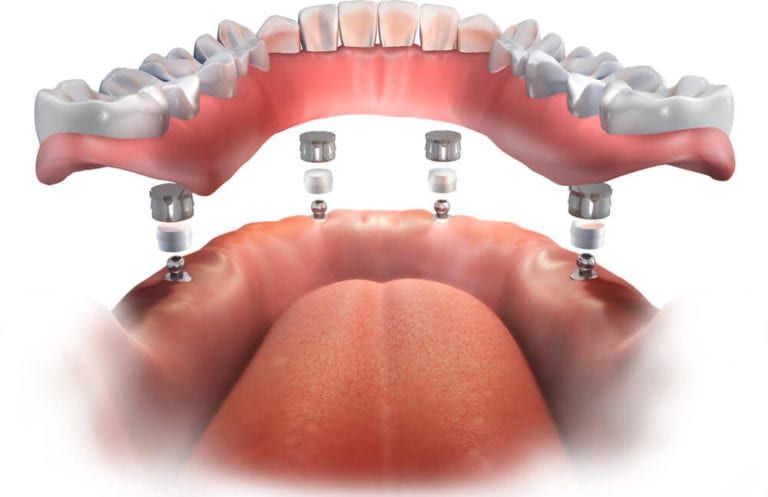All-on-four dental implants have become an increased demand among patients. Through our expertise, you can learn more about this form of treatment, what factors are expected for patients after treatment, and how all-on-four implants can help replace missing teeth and restore gum and jawbone health.
What are All-on-4 dental implants?
The All-on-4 dental implants replace all your missing teeth on the upper or lower jaw using only four implants, which are inserted using a virtually painless procedure.
There is a multitude of reasons why people choose the All-on-4 implants such as:
- No need to remove and clean the teeth
- Aesthetics (the implants look like natural teeth)
- Prevention of bone deterioration since the implants are in the jaw
- Stability so you can bite down with increased force
Dr. Atcha is an expert at this state-of-the-art procedure and has performed more than 10,000 All-on-4 dental implant procedures.
In addition to placing implants in your jaw bone, he can make use of your zygomatic bone to anchor longer implants. These longer implants work well for people whose upper jaw is deficient in bone or who wear upper dentures that don’t fit well despite having them fixed multiple times.
What is the difference between traditional implants and the All-on-4 implant procedure?
The All-on-4 implants procedure requires no bone grafting for most patients, while traditional implants often require bone grafting, a process that can take six months or longer. Traditional implants also require five to eight implants for one arch of teeth while the All-on-4 procedure only uses four implants for your upper or lower arch of teeth.
Dr. Atcha places the implants of the All-on-4 procedure at an angle, allowing them to have an increase in support by using the natural support of your jaw bone.
What can I expect after the All-on-4 dental implants procedure?
The procedure is relatively fast, taking approximately two to three hours per arch. Thankfully, published studies show a 98% success rate using All-on-4 dental implants.
Some side effects of the procedure may include pain, swelling, and soreness at the treatment site. Nonetheless, all of these symptoms should subside within a few days.
Dr. Atcha recommends you rest so you can adjust to your new implants for one to two days following the procedure. In addition, you should take care of your new implants the same way you would regular teeth by flossing, brushing, and visiting Dr. Atcha a minimum of twice a year for dental check-ups.
How long do All-on-4 dental implants last?
The longevity of All-on-Four implants can vary based on several factors, including individual oral health, oral hygiene practices, and lifestyle choices. When properly cared for and maintained, All-on-Four implants have the potential to last for many years, even decades. However, it’s important to note that the lifespan of the prosthetic teeth themselves may be shorter than the implants. The prosthetic teeth may require periodic replacement due to normal wear and tear or changes in oral health.
Here are some factors that can influence the longevity of All-on-Four implants:
- Oral hygiene: Maintaining good oral hygiene practices, including regular brushing, flossing, and professional dental cleanings, is crucial for the long-term success of All-on-Four implants. Proper oral care helps prevent gum disease and implant-related complications that could impact the implants’ lifespan.
- Bone health: The stability and longevity of dental implants are dependent on the health and quality of the surrounding jawbone. Adequate bone support is essential for the long-term success of All-on-Four implants. Maintaining good overall oral health and addressing any issues promptly can help preserve the supporting bone structure.
- Lifestyle factors: Certain habits and lifestyle choices can affect the longevity of dental implants. For example, smoking has been shown to increase the risk of implant failure. Additionally, habits such as teeth grinding or clenching (bruxism) can exert excessive force on the implants and prosthetic teeth, potentially leading to complications over time.
- Regular check-ups: Routine follow-up visits with your dentist or prosthodontist are essential to monitor the health of your implants and address any potential issues early on. Regular examinations and maintenance can help detect and resolve problems before they lead to implant failure.
It’s important to remember that individual experiences may vary, and some factors, such as underlying health conditions or anatomical variations, can influence the long-term success of All-on-Four implants. Consulting with an experienced implant dentist or prosthodontist is crucial to assess your specific case, provide personalized guidance, and offer realistic expectations regarding the lifespan of All-on-Four implants based on your unique circumstances.
If you’re ready to replace your missing teeth and gain a million-dollar smile, then call New Teeth Chicago Dental today, or book your appointment online.

